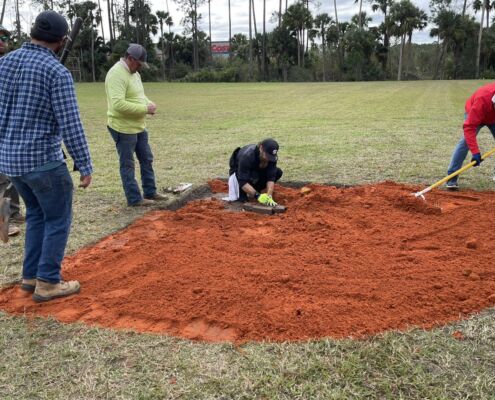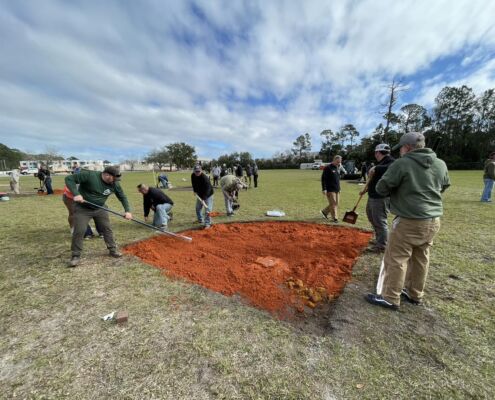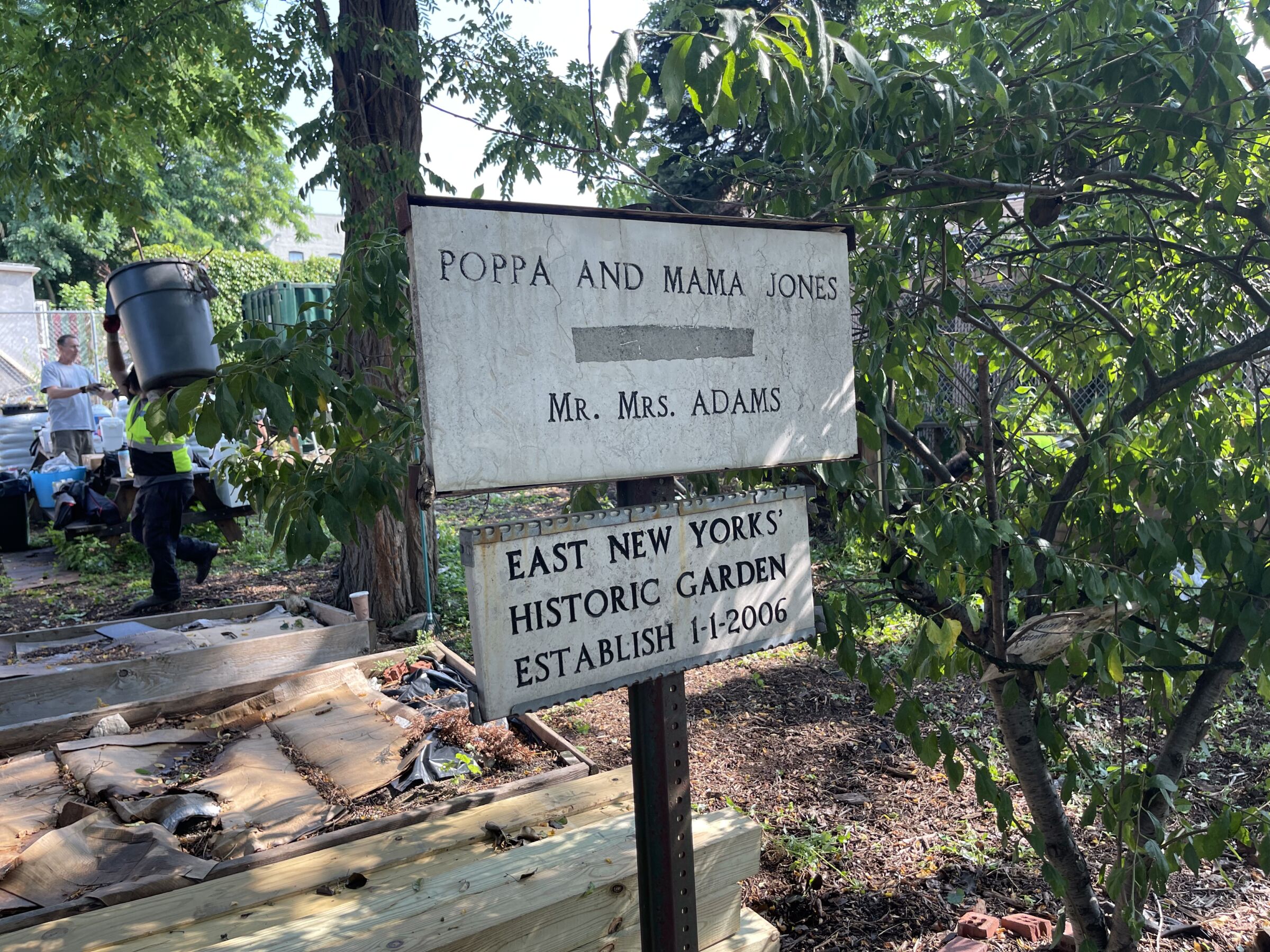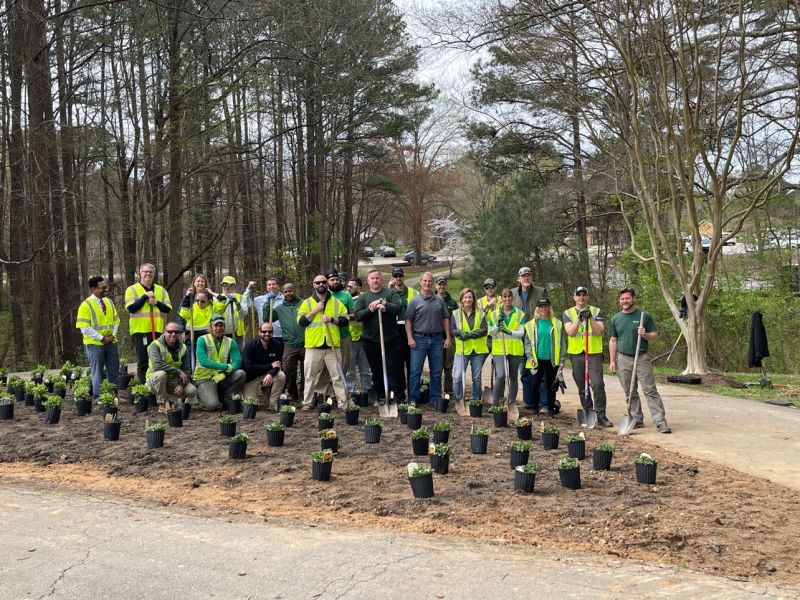Palm Terrace Elementary School
Palm Terrace Elementary School
1825 Dunn Ave.
Daytona Beach, FL 32114
Palm Terrace Elementary School
1825 Dunn Ave.
Daytona Beach, FL 32114
Photo/Video Credits: Project EverGreen, Boy Rooster Films, Volusia County Schools and Shape Cleveland
January 2024
$35,000
$15,000
Project Overview
Project EverGreen, members of the Sports Field Management Association (SFMA) and the Volusia County Schools teamed up on Sunday, January 21, 2024 at Palm Terrace Elementary School in Daytona Beach to give the school’s long dormant baseball field and grassy play area a $35,000 makeover.
The goal of the renovation project was to leave the school and community with a safe, well-maintained, and accessible ballfield and recreation space they can call their own.
“A single group or individual cannot make these transformations a reality. Project EverGreen builds coalitions of businesses and individuals to make it happen,” said Cindy Code, executive director of Project EverGreen. “Schools with healthy and well-maintained athletic fields and recreation spaces improves the social fabric of a community by providing a place to safely compete, exercise and connect in an outdoor space.”
Project EverGreen works with under-resourced communities to renovate, maintain, and make more accessible healthy playing fields, as well as to improve the environmental health of public green spaces. The 100,000 square feet of grass at the Palm Terrace play field is responsible for sequestering nearly 60,000 pounds of carbon from the air annually which is equivalent to removing 7.5 cars fueled by gas from the road.
Together with financial and in-kind contributions and support from professional volunteers, park renovations not only create a healthy, safe green space, but establish healthy community hubs that promote future improvements in and around the school and outdoor play area.
“We are humbled by Project EverGreen’s generosity, time, service, and thankful for their commitment to empower others, especially our students. Their support makes a huge impact in our community,” said Karen Troutman, principal of Palm Terrace Elementary.
The school is part of Volusia County Schools which has 90 schools and more than 62,000 students. The school’s dormant ballfield needed renovation to guarantee it would become a safe, environmentally sustainable part of the Palm Terrace Elementary community.
This is the fourth community athletic field and green space renovation project the two organizations have joined forces to complete. Previous projects include Phoenix (2019), West Palm Beach (2020) and Savannah (2021).
The athletic fields and green spaces around Daytona Beach’s Palm Terrace Elementary School are critical to urban areas as they offset the heat island effect and provide the surrounding area with cleaner air through carbon sequestration. They also provide children and adults with a safe, well maintained space to relax, exercise and compete.

Scope of Work
Ballfield
Turf Area
Core or deep tine aerate all turf areas (approximately 100,000 SF)

Why Are Green Spaces Important to Schools
Green spaces at schools offer a multitude of benefits! Firstly, they provide a breath of fresh air—literally. They improve air quality, making the environment healthier for both students and staff. These spaces also serve as a natural stress-reliever, offering a calming atmosphere that can enhance students’ well-being and focus. Additionally, green areas provide opportunities for outdoor learning and play, promoting physical activity and a deeper connection to nature. It’s like having a classroom without walls!
Green spaces are important for several additional reasons:
Environmental Benefits: Green spaces help to mitigate the urban heat island effect, reduce air pollution, and provide habitats for wildlife. They also help to reduce storm water runoff and prevent flooding.
Health Benefits: Access to green spaces has been shown to improve mental health, reduce stress, and promote physical activity. In a city like New York, where many residents live in areas with limited access to fresh food and safe outdoor spaces, green spaces can provide important opportunities for exercise and recreation.
Social Benefits: Green spaces provide a gathering place for community events and activities, fostering a sense of community and social cohesion. They also provide opportunities for volunteerism and community engagement.
Economic Benefits: Green spaces can increase property values and attract businesses, tourists, and new residents to the area. This can lead to increased economic activity and job creation.
Project EverGreen’s Impact
Parks, lawns, landscapes and maintained green spaces help to mitigate temperature increases in communities and significantly reduce energy use and cooling costs. Project EverGreen’s GreenCare for Communities initiative has made a significant impact. Since 2008, Project EverGreen and its partners have renovated community parks and public green spaces totaling more than 200 million square feet of living green space.
Through its nationwide base of professional volunteers, Project EverGreen has connected people, plants, and their communities to maximize the health of grass, plants, and trees, which in turn sequesters carbon and cleans the air. The initiative supports healthy green spaces in neighborhoods and cities, enabling maintained green spaces to function as the lungs of the city and offsetting the negative effects of a warming environment.
Project Scope
Ballfield
Turf Area

 Sanderford Road Park – Raleigh – 2024
Sanderford Road Park – Raleigh – 2024